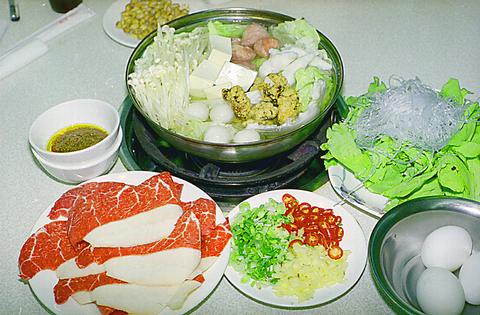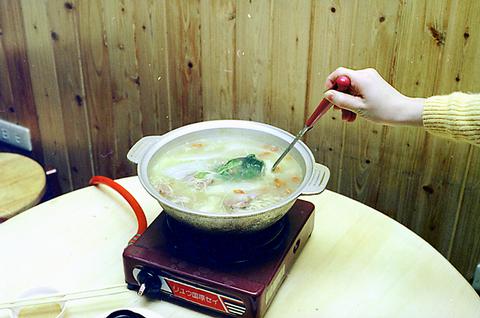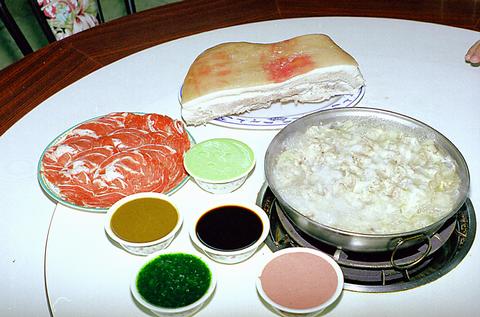Chinghsiang Shantou Shacha Hot Pot (清香廣東汕頭沙茶火鍋)
5, Lane 82 Hsining S Rd. (西寧南路82巷5號), tel: 2331-9561, 2331-9562. Open: 12 noon to 1 am; average meal: NT$400; No English menu; credit cards no accepted.

PHOTO: YU SEN-LUN
Located in Taipei's Hsimenting district for more than 40 years, Chinghsiang has maintained its popularity for one very simple reason -- its homemade Shacha Sauce (

PHOTO: YU SEN-LUN
Shacha sauce is a standard of Taiwanese cooking and is available at most convenience stores and groceries. But for those who crave the genuine Shantou Shacha sauce, originally from the town in China's Guangdong Province, Chinghsiang is the best place to go.
Owner Wu Hsiu-fang (

PHOTO: YU SEN-LUN
"Our Shacha sauce, our hot pot broth, and honest service are what we have built our brand on," said Wu. These same things keep this venerable establishment in business in the face of growing competition from fancier hot pot establishments.
Chinghsiang's Shacha sauce is made of ground peanuts, sesame oil and "naturally there are ingredients we won't reveal," says Wu with a smile. The sauce enhances the flavor of the many meats and vegetables that can be added to the hot pot -- from frozen tofu, which acts like a sponge and is ideal for getting a full mouthful of the flavor, to sliced beef, fish balls, squid and duck intestines, vegetables and much else.
Teh-Keh Lamb Hot Pot (德哥羊肉爐)
109, Linsen North Rd. (林森北路109號), tel:2511-8491. Open: 5pm to 5am, average meal:NT$700; no English menu; credit cards not accepted.
Because of his love for lamb -- the cooked variety -- Chang Hsien-teh (
In Chinese medicine, lamb is regarded as a "warm" meat suited for winter eating. Lamb hot pot (羊肉爐) is a typical Taiwanese winter tonic. It is usually stewed with Chinese herbs and served in dark, highly flavored broth. But at Teh-Keh, the soup is clear and the taste is pure. "Most lamb hot pots use imported lamb. With the meat frozen, the food must be strongly flavored to cover-up the poor quality of the meat," he said.
Chang uses flesh from local goats that are killed just prior to delivery. "And it's all eaten up within 72 hours. Freshness means a sweet taste and the absence of a mutton flavor [which is the reason why many people dislike mutton.]" The stock is made from the spin of the goat, which is stewed for a whole day. Its pure flavor makes additional spices unnecessary.
In addition to the house standards, ginger-flavored lamb hot pot, a variety of other flavors are available, including fish head hot pot and medicinal wine hot pot.
To provide for a wide range of tastes, Teh-Keh also offers many traditional Taiwanese dishes, which ensures a good variety of flavors to complement the hot pot. Bitter gourd with salted egg (
Chang-bai Bistro (長白小館)
53, Lane 240 Kuanfu S Rd. (光復南路240巷53號), near the Sun Yat-sen Memorial Hall MRT station, tel:2751-3525, 2711-2643. Open:11:30am to 2pm, 5pm to 9pm; average meal:NT$500; English menu for non-hot pot dishes; credit cards not accepted.
If you have never tasted the delicate flavor of a pickle and white meat hot pot (
Simply mixing the dip is a thrill. It is made up of 12 ingredients and if you are approaching this taste for the first time, Sung is happy to point you in the right direction. "First, one spoon of sesame sauce, half a spoon of garlic paste and scallion sauce, one spoon of fermented tofu sauce, half a spoon of shrimp oil and chili sauce and then some mustard sauce, coriander leaves and chopped green onions," he said. Many of these ingredients, such as the fermented tofu sauce and the mustard, are prepared in Chang-bai's kitchen.
The white meat is belly pork that layers fat and lean meat. Preparing this meat to make it taste right is a complicated process that involves sweating out excess oil through steaming, followed by washing and freezing. "Sixty percent of the oil is removed and the meat is not the least greasy," Sung said. Although the meat is "fatty," Sung said that many people find it delicious after tasting it. For people who don't eat pork, Chang-bai also has portions of sirloin beef and sliced mutton, prime cuts sliced thin to melt in your mouth. The stock is made from chicken, so that Chang-bai is also popular with Chinese Muslims.
In addition to the hot pot, Chang-bai has a number of northern specialties, such as scallion pancakes (

Aug. 25 to Aug. 31 Although Mr. Lin (林) had been married to his Japanese wife for a decade, their union was never legally recognized — and even their daughter was officially deemed illegitimate. During the first half of Japanese rule in Taiwan, only marriages between Japanese men and Taiwanese women were valid, unless the Taiwanese husband formally joined a Japanese household. In 1920, Lin took his frustrations directly to the Ministry of Home Affairs: “Since Japan took possession of Taiwan, we have obeyed the government’s directives and committed ourselves to breaking old Qing-era customs. Yet ... our marriages remain unrecognized,

During the Metal Ages, prior to the arrival of the Dutch and Chinese, a great shift took place in indigenous material culture. Glass and agate beads, introduced after 400BC, completely replaced Taiwanese nephrite (jade) as the ornamental materials of choice, anthropologist Liu Jiun-Yu (劉俊昱) of the University of Washington wrote in a 2023 article. He added of the island’s modern indigenous peoples: “They are the descendants of prehistoric Formosans but have no nephrite-using cultures.” Moderns squint at that dynamic era of trade and cultural change through the mutually supporting lenses of later settler-colonialism and imperial power, which treated the indigenous as

An attempt to promote friendship between Japan and countries in Africa has transformed into a xenophobic row about migration after inaccurate media reports suggested the scheme would lead to a “flood of immigrants.” The controversy erupted after the Japan International Cooperation Agency, or JICA, said this month it had designated four Japanese cities as “Africa hometowns” for partner countries in Africa: Mozambique, Nigeria, Ghana and Tanzania. The program, announced at the end of an international conference on African development in Yokohama, will involve personnel exchanges and events to foster closer ties between the four regional Japanese cities — Imabari, Kisarazu, Sanjo and

By 1971, heroin and opium use among US troops fighting in Vietnam had reached epidemic proportions, with 42 percent of American servicemen saying they’d tried opioids at least once and around 20 percent claiming some level of addiction, according to the US Department of Defense. Though heroin use by US troops has been little discussed in the context of Taiwan, these and other drugs — produced in part by rogue Chinese Nationalist Party (KMT) armies then in Thailand and Myanmar — also spread to US military bases on the island, where soldiers were often stoned or high. American military policeman